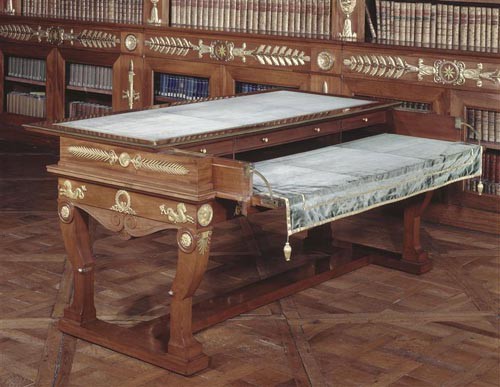A busy workday
After a quick lunch, Napoleon would shut himself away in his office with his secretaries and work until the evening. He devoted a lot of attention to writing letters: he wrote to ministers, generals, préfets and everyone who carried out his orders. He also wrote to ambassadors and foreign ministers and monarchs. Last of all, Napoleon wrote continuously to his family, particularly as he was often on campaign away from Paris. We know Napoleon to have written over 36,000 letters, and he probably wrote many more. He had to dictate his letters, often to a number of secretaries at once, as his handwriting was illegible. He would often write letters on a number of different subjects at the same time, so his secretaries had to be very patient.
During the afternoon, Napoleon would receive his ministers to work on different projects relating to the running of the government. Very little escaped his attention and he took an interest in everything that was going on. He was particularly concerned with the state budget and the organisation of the Grande Armée. Three or four times a week he would hold meetings with his Conseil ministers. The afternoon was also often taken up with visits to ongoing project sites, such as the Musée du Louvre and the building works that went on in Paris. On top of all this, Napoleon also spent a lot of time visiting the various regions in the empire.
An evening of (often) serious work
Dinner would be served at 6pm but Napoleon would often forget and continue to work in his office. The servants would often have to keep everything warm ready for a dinner that Napoleon would take just as quickly as lunch. After dinner, Napoleon would usually go back to work, often staying late into the night. He had few recreational past-times, but he loved to read and go to the theatre. When staying at one of his country retreats, such as Malmaison or Fontainebleau, he would happily spend his evenings in the company of his family and friends.


